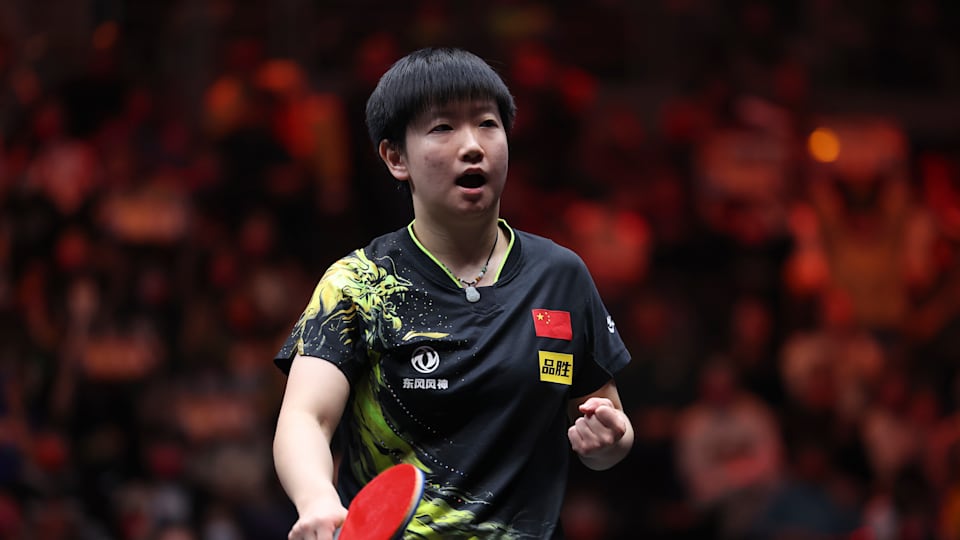Sun Yingsha: How the Youth Olympic Games helped propel my career
The world number 1 has been in the top three of the rankings since November 2019, and credits her gold medal at the Buenos Aires 2018 Summer Youth Olympic Games for helping her development.

When Sun Yingsha takes to the court at this year's table tennis Singapore Smash later this month in the season's first Grand Smash event, she will do so once more at the top of the world rankings.
Last year's inaugural event saw the 22-year-old exit at the semi-final stage, which dropped her ranking to number 2, but by July Sun had recovered her top position which she has not since relinquished.
The Chinese shuttler's rise to the top has been noticeable since she competed at the 2018 Summer Youth Olympic Games (YOG) in Buenos Aires – an event Sun still credits as helping her development to this day.
Speaking last year to Olympics.com via the ITTF, she explained: "It was a very important turning point for me, as (before YOG) I didn't have much experience in major competitions."
Therefore, her run in the Argentinian capital – where she defeated Japan's Hirano Miu in the final – came as a learning experience to her. "I was a young player and didn't have the same level of competition experience as someone like Hirano Miu, who was already an absolute mainstay of the Japanese team.
"I realised that my overall strength might not be as good as hers, but I was able to truly let go of that pressure and just focus on playing every shot to my best," Sun recalled.
That first taste of major competition experience only served to drive the Hebei Province native on to more.
Sun Yingsha on learning from her YOG experience
The nature of YOG – where each team was limited to one men's and one women's player, with only a small supporting crew – also played a part in forming Sun's methods of preparation, she remembered.
"During the Youth Olympic Games, I was the only (female) player from my team, and I only trained with coaches Yan Sen and Chen Zhenjiang. During singles training, I only had the opportunity to warm up with coach Yan Sen before matches."
Aside from the lack of sparring partners – something that is not an issue at the Olympic Games, World Championships, and other World Table Tennis events – there was the factor of Sun's relative lack of experience compared to Hirano, who was the Asian continental and World Cup singles champion.
"The preparation process for the Youth Olympics was also unforgettable. Every day, I prepared myself mentally to possibly lose and trained hard. So when I reached the final and played against Hirano Miu, my mentality was pretty good," Sun says.
It's an experience Sun took with her as she moved through the ranks.
The following year, 2019, was when Sun experience her breakthrough at senior level, as she won the Japan Open, Australian Open, German Open, and Asian continental titles, in addition to helping China win the Team World Cup.
That put her into the world's top 3 in the rankings of November 2019 days shy of her 19th birthday, a position she hasn't given up since.
Her continued success saw her selected for the Olympic Games Tokyo 2020 having not yet turned 21, the youngest Chinese table tennis Olympian since 20-year-old Guo Yue at Beijing 2008.
While Tokyo 2020 was Sun's first Olympic Games, she did not approach it as her debut, with the good memories of Buenos Aires 2018 in her back pocket.
"I played in the Youth Olympics when I was 18 (17) years old, and played in the Tokyo Olympic Games when I was 21 (20) – both of these events were Olympic competitions in my opinion," she said.
Sun Yingsha: Why the Olympic Games are so special
While Sun did not win singles gold in Japan – team-mate and then-world-number-1 Chen Meng defeated her in the final – the tournament left a mark on Sun.
Aside from her team gold medal, she picked out her singles semi-final win over Japan's Ito Mima, then ranked ahead of her at world number 2 (Sun was third), as a moment that will stay with her.
"Maybe when I retire, the Tokyo Olympic Games will be the most memorable for me. First of all, it was my first Olympic Games, and facing Ito Mima in the semifinals of the singles event was a test for myself.
"I'm happy and fortunate to have won the match, so I think this moment of happiness will always stay in my heart."
Sun is also keenly aware that she will not have that many opportunities to win an Olympic singles gold medal.
"The Olympics only take place once every four years – that's the pressure, the time. If you lose, you have to wait another four years. Unlike the World Cup that's every year or the World Championships every two.
"In the blink of an eye, I've gone from 20 and will be 24 (23 – in Paris); another blink of an eye and I'll be 28 (27), then I will be in my 30s. So I feel like the Olympic stage will always inspire all athletes' unlimited potential.
"Not just the Chinese team, but other teams – everyone really cherishes the Olympic stage. It's once every four years; no one gives up on any point. Sometimes when I watch their matches, they are even more intense than ours, and that feeling that of craving winning."
The road to Paris 2024 continues – and with ranking points on offer from June, every tournament this year will be important as the athletes begin to mould themselves into top form.
